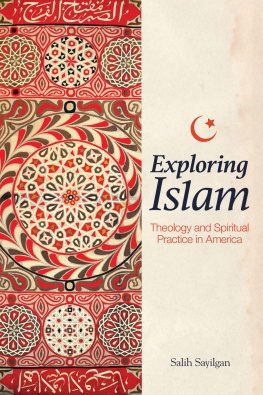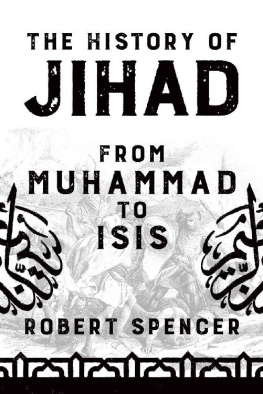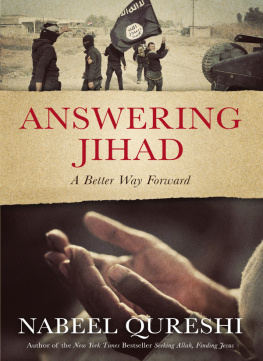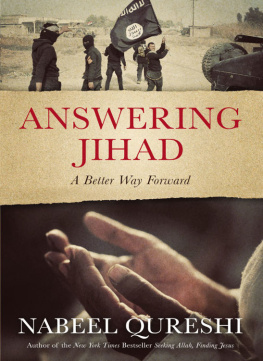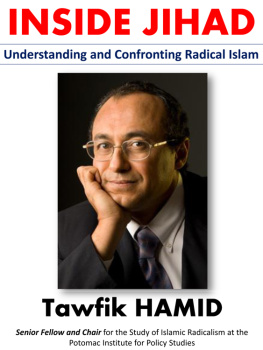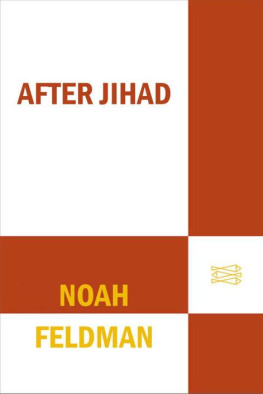Copyright 2019 Salih Sayilgan. All rights reserved. Except for brief quotations in critical publications or reviews, no part of this book may be reproduced in any manner without prior written permission from the publisher. Write: Permissions, Wipf and Stock Publishers, W. th Ave., Suite , Eugene, OR 97401 .
W. th Ave., Suite
Names: Sayilgan, Salih.
Title: An Islamic jihad of nonviolence : Said Nursis model / Salih Sayilgan.
Description: Eugene, OR: Cascade Books, 2019 | Includes bibliographical references.
Identifiers: isbn 978-1-5326-5755-9 ( paperback ) | isbn 978-1-5326-5756-6 ( hardcover ) | isbn 978-1-5326-5757-3 ( ebook )
Subjects: LCSH: Jihad | JihadHistory | Nursi, Said 18731960 | NonviolenceReligious aspectsIslam | IslamDoctrines | War (Islamic law)
Manufactured in the U.S.A. January 22, 2019
Dedicated to the students of the Risale-i Nur for their peaceful jihad.
We are competitors of love; we have no time for enmity.
Acknowledgements
W ords will remain insufficient to express my gratitude for the support I received while working on this project. I would like to begin by acknowledging the work of kran Vahide, who has been a pioneering scholar in Nursi studies. This project relies significantly on her translation of the Risale-i Nur , as well as her biographical work on Said Nursi.
I am grateful to Lucinda Mosher for editing the first draft of the manuscript and making valuable suggestions. Special thanks go to Ahmet Yldz, Alparslan Akgen, and Faris Kaya who read and provided important ideas for improving the manuscript. I am also grateful to Niyazi Beki and Hakan Glerce for helping me with the research while working on this project. The editorial team of Cascade made the publication of this work a smooth process. I am especially thankful to Matthew Wimer, Daniel Lanning, Heather Carraher, my editor Robin Parry, and my copyeditor, Caleb Shupe.
My deepest appreciation goes to my wife Zeyneb and daughter Elif. Zeyneb not only read the manuscript and made significant suggestions for improvement, but also provided love and care. Without her support, I could not have concluded this project.
Introduction
I t is not uncommon to see Islam and Muslims mentioned alongside terrorism and violence. Let alone popular media, one can even observe these names side by side in the title of courses offered at universities.
In mainstream media and among the general public, three misleading assertions concerning Islam seem to be constantly at play. First is the assertion that Islam is inherently a violent religion. Selected verses from the Quran and some of the traditional sayings of the Prophet Muhammad are routinely cited as evidence, along with noting that the Prophet himself was involved in many battles and that wars were a factor in the expansion of the Muslim state and the establishment of the Islamic empire. Thus it is argued that Islam was spread through jihad and sword. But, to bolster this assertion further, its proponents point to violence committed in the name of Islam and conflict rampant in certain Muslim societies today.
A second assertion is that Islam is a political ideology rather than a source of meaning, values, and spirituality for its adherents. This is founded in part on the fact that, during the twentieth century, many Muslims did believe that political Islam could solve the problems of Muslim societies. The idea was that an Islamic government would serve best in ruling a society based on Islamic values.
A third assertion is that Islam is unable to accommodate a secular environment that is tolerant to religion. That is, in order to live a life in accordance with Gods will, one must live in a society that is ruled according to Islamic law ( sharia )a notion many Muslims do, in fact, believe.
The thesis of this book is that there exists an Islamic model that offers a direct challenge to these three assertions, a model provided by the distinguished Muslim theologian Bediuzzaman Said Nursi ( 1877 1960 ). A charismatic and deeply spiritual personality who witnessed the collapse of the Ottoman Empire and the emergence of modern Turkey, Nursi was determined to offer new resources to bridge the gap caused by the establishment of a new secular state that terminated the institutions providing religious education and nurturing Islamic spirituality. This became his daily jihad , the price for which he would be exiled and imprisoned. This book relates the history and method of spiritual jihad with positive action ( msbet hareket ) as its hallmarkas taught and demonstrated by Bediuzzaman Said Nursi. It lays out the guidelines he provided to aid Muslims in living a peaceful and spiritual life in a secular environment.
Chapter situates Nursi in his historical context. Chapter provides a brief overview of his magnum opus , the Risale-i Nur , examining its emergence and its major themes. Chapter is a survey of the notions of jihad and martyrdom in Islam. Chapter presents the foundations of Nursis philosophy of positive action ( msbet hareket ) as well as his view of suffering and death. Chapter defines the components of inward jihad in Nursis writings: impotence ( acz ), poverty ( fakr ), compassion ( efkat ), and contemplation ( tefekkr )and the steps for cultivating them. Chapter provides Nursis interpretation of jihad and martyrdom in the modern time and his view of other faiths. Chapter presents Nursis guidelines for the community of believers in the modern context: his emphasis on sincerity ( ihlas ), free service to faith ( iman ), avoidance of politics, rejection of hierarchy, and the preference of community over and against excessive individualism.
In chapter , Nursi is put in conversation with three of his contemporariesmajor figures with a profound commitment to non-violent forms of civil disobedience: Mohandas Gandhi ( 1869 1948 ), Nelson Mandela ( 1918 2013 ), and Martin Luther King Jr. (). Each risked his life in the pursuit of justice. Each was imprisoned because of the position he took. Each was a charismatic figure whose teachings and example enabled a dramatic transformation of their respective societies. As will be demonstrated, Nursi belongs into their company.
This work concludes with a consideration of the usefulness of Nursis model of positive action ( msbet hareket ) emphasizing spiritual or moral jihad ( cihad- mnev ) and examines it as a method for facing the challenges of the twenty-first century.
Part
Said Nursi
Chapter 1
Said Nursis Life and Context
The Formation of Nursi
Bediuzzaman Said Nursi (18771960 CE) was a Muslim child prodigy, scholar, spiritual leader, and educational reformer. His literary legacy, the Risale-i Nur a six-thousand-page commentary on the Quranhas made an ongoing claim on an extensive and rapidly expanding group of people in Turkey and beyond.
In his lifetime, Nursi saw the dissolution of the Ottoman Empire, endured the anti-Islamic policies of Turkeys post-World War I Republican Peoples Party, and enjoyed the somewhat improved conditions established by Turkeys democratic government. He is best described as an Islamic revivalist. A brief explanation of Nursis historical context will give us a better understanding of the roots of his positive action ( msbet hareket ) and ethic of nonviolence.


